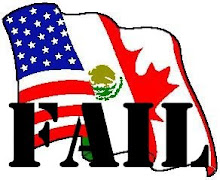Consider this piece from a Windsor (Ontario) newspaper (Windsor and Detroit are separated by a bridge).
In the article, the author tries to present a case for a less-stringent border due to the intertwined community and economy that exists between the two border communities. He talks about the economic spinoff Windsor saw from recent Final Four games, and how Detroit would receive similar spinoffs from upcoming events hosted on the Canadian side (although with the cheaper Canadian dollar, I'm not sure why Americans would want to stay in Detroit when they can get accommodations for less in Canada).
He also goes on to talk about how many Canadian nurses cross over the border every day to work in US hospitals. For a country dealing with high unemployment rates, this might not be the *best* argument to use for why the border should stay more open than closed.
But what's interesting is that there is, throughout the article, an air of entitlement; that people from Windsor had been crossing into the US for decades, seeing their brethren across the water as extensions of their community and not as part of an entirely separate one.
And don't get me wrong, that's a good thing. But at the same time, it also shows that we have come to take our border with the US for granted...and not just for granted, but that we somehow have ownership of that border. I would wager this sentiment is true for many border communities.
The author closes the article with this statement:
It's time for Ottawa and Washington to begin focusing on the removal of the unnecessary barriers to goods and services, and get our border working efficiently and effectively.
Realize that I absolutely agree with this. We need to have fair rules in place for Canadians crossing into the US and vice versa, and those rules need to be clear and easily understood by both countries.
But that’s not a border issue, that’s a policy issue. The border between our countries has always been that: a line drawn to separate two separate entities. A strong cross border community does not mean we get to ignore what that line truly represents or the ability of the countries on either side of that line to implement their government policies regardless of how incredibly stupid they may seem. It does mean, however, that we can and should complain loudly at what we see as damaging policy to both sides of the border…we just need to respect that border at the same time.




No comments:
Post a Comment